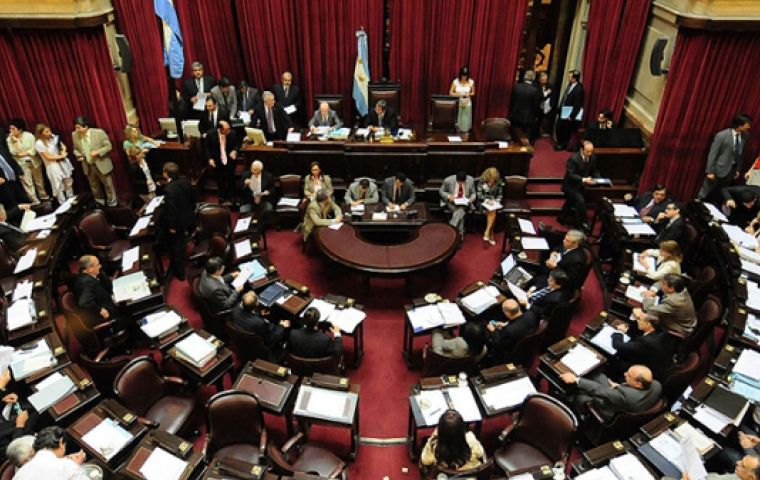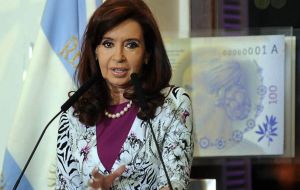MercoPress. South Atlantic News Agency
Argentine congress overwhelmingly approves deal with creditors to end 15-year conflict
 The senate began debating on Wednesday morning and on early Thursday passed the measure by 54 votes to 16.
The senate began debating on Wednesday morning and on early Thursday passed the measure by 54 votes to 16.  The vote is also a boost for President Mauricio Macri, who campaigned on promises to restart the economy, in large part by solving the complex bonds dispute
The vote is also a boost for President Mauricio Macri, who campaigned on promises to restart the economy, in large part by solving the complex bonds dispute  Macri's predecessor as president, Cristina Fernandez, had refused to negotiate with the creditors, calling them “vultures” who were trying to bully Argentina.
Macri's predecessor as president, Cristina Fernandez, had refused to negotiate with the creditors, calling them “vultures” who were trying to bully Argentina. After 13 hours of debate, Argentina's senate voted overwhelmingly to approve a deal with creditors in the US, putting an end to a sovereign bonds' dispute that had lasted 15 years. The deal was reached in late February, and the Lower House passed it earlier this month. The senate began debating on Wednesday morning and on early Thursday passed the measure by 54 votes to 16.
It puts an end to a bitter chapter that made Argentina a financial pariah and was often a point of sharp political clashes. The vote is also a boost for President Mauricio Macri, who campaigned on promises to restart South America's second largest economy, in large part by solving a dispute so complex it led to changes in how debt contracts are restructured worldwide.
While Macri's PRO party does not control either chamber in congress, most analysts had predicted the measure would pass because Argentina is strapped for cash and needs foreign investment to begin growing after four years of economic stagnation.
Macri's predecessor as president, Cristina Fernandez, had refused to negotiate with the creditors, calling them “vultures” who were trying to bully Argentina.
The issue was a central part of last year's presidential campaign. Macri and his opponent Daniel Scioli, Ms Fernandez's chosen successor, clashed over whether a deal was necessary and who would be the tougher negotiator.
The seeds of the dispute go back to 2001-2002, when Argentina defaulted on 100 billion US dollar debt. Most holders of the original debt, along with those who bought up bonds in the aftermath, agreed to swaps in 2005 and 2010 for bonds worth far less.
But a group of creditors led by billionaire hedge fund manager Paul Singer refused. They took Argentina to court in New York, where the debt was issued, and won.
US District Court Judge Thomas Griesa in New York repeatedly ruled against Argentina, saying the country had to pay the holdouts before it could pay other creditors holding renegotiated debt.
Those rulings kept Argentina from accessing international credit markets, forcing it to issue domestic bonds and search for back-door financing from countries like China.
During the years of fighting, the initial debt ballooned as other holdout groups began suing and legal fees mounted. The long, costly dispute led to changes in how debt is issued worldwide. Many countries have restructured contracts in attempts to avoid getting into similar situation. Under the deal, Argentina will pay 4.653 billion US dollars to resolve claims related to the court fight.
The bill approved overrules two previous ('paddock') ones from Cristina Fernandez' time which basically prevented Argentina from paying the holdouts, and allowed the Treasury to issue up to 12bn dollars in bonds to meet creditors demands and other commitments.
President Macri was informed of the vote while travelling to Washington to attend a world summit on nuclear security. The head of state travelled with First Lady Juliana Awada, and was received in the US capital by the Argentine Ambassador to the United States Martín Lousteau.
Friday night Macri is scheduled to attend a work dinner offered by his US counterpart Barack Obama for all the presidents attending the summit.
On Friday, Macri will participate in several activities scheduled in this fourth summit which is held to prevent nuclear terrorism around the globe. The Argentine leader is expected to refer to “the involvement of Argentina in the nuclear agenda” with “a very precise message,” Foreign Affairs Minister Susana Malcorra told a press briefing.




Top Comments
Disclaimer & comment rules-

-

-

Read all commentsMacri succeeded bringing Argentina back to the world. Which means now productive investments will begin pouring into the country, the domestic sectors will flourish, jobs will be created, the middle class will prosper, poverty zero will be reached, and the country will definitely leave behind its tormented past and be welcomed to the exclusive club of the “almost-developed” countries. Who said Macri was the champion of the oligarchic restoration? I did? Oh, sorry, Just dreaming.
Apr 01st, 2016 - 06:12 am 0EM
Apr 01st, 2016 - 07:08 am 0Entertaining sarcasm.
It looks like you actually understand that he has economic goals to reach for and is using all the tools at his disposal to do so.
Seems more reasoned than CFK's giving past creditors the finger and selling out Argentina's resources in an open-ended bailout scheme from China.
They don't spend money for nothing. CFK would have mortgaged Arg's future.
I don't think the “almost developed” countries are that interested in being in that club. They want to be in the developed countries club.
Apr 01st, 2016 - 07:12 am 0A bit like Enrique when he chose a country to emigrate to. He didn't choose and almost developed country. Why should the country he left being choose it?
Commenting for this story is now closed.
If you have a Facebook account, become a fan and comment on our Facebook Page!